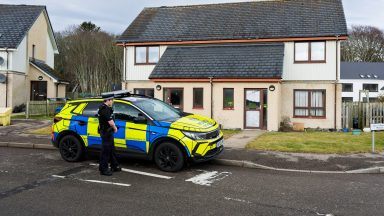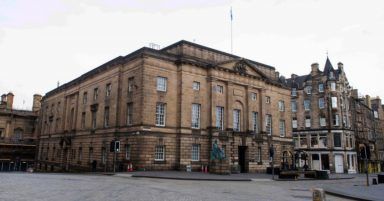Airbnb hosts have criticised Edinburgh City Council over its crackdown on short-term lets, claiming Scotland will become a “laughing stock” if proposed legislation goes ahead in its current form.
The city could see an 80% drop in properties for hire on Airbnb when a new licensing scheme for short-term lets comes into force on October 1, according to report for the City of Edinburgh Council.
Many people in the city have welcomed the proposals after expressing concern about the high number of short-term lets such as Airbnb-type properties in the Scottish capital.
But owners of short-term, rental properties have criticised the changes as an “act of self-sabotage on their businesses and livelihoods”.
Among those is Louise Dickins, who is the self-catering host and owner of Dickins Edinburgh.
She said: “The Scottish Government has relinquished control of Scotland’s £6bn tourism industry to local authorities and Edinburgh Council is about to tank the entire industry for the whole country.
“What operator in Edinburgh will spend £3,000+ on a non-refundable license with the knowledge they only have a 20% chance of getting approved?
“Perhaps it is because it is in a joint for-profit venture to launch its own hotel.
“One council is now in the vanguard of tanking the tourism industry for the entire country and – if allowed to succeed – we should all say goodbye to the Edinburgh Fringe, Taylor Swift concerts, and the small pubs, restaurants and small businesses that depend on tourism.”
The Scottish Government’s new licensing scheme requires hosts of these properties to display energy performance ratings on listings, have adequate buildings and public liability insurance, as well as various fire and gas safety precautions.
Businesses have to register by October 1 to ensure they can continue trading, with housing minister Paul McLennan having said previously it is “important that there is appropriate regulation in place to ensure the safety of guests”.
But, as of August 7, only a reported 245 licence applications had been submitted to the City of Edinburgh Council out of the 12,000 estimated properties currently used for short-term let.
Ms Dickins said: “The government’s legislation will make Scotland a laughing stock around the world. They seem to be determined to harm the most successful parts of our economy, businesses, and people, all the while confused about why they are doing so.
“The government says its legislation is to increase health and safety standards – I’m all in favour of that, but it is already legislated for. They also say it is to put more homes back on the market during a housing crisis.
“The problem is there are more empty homes than self-catering properties. This ignores the truth that self-catering accommodation often isn’t suited for private housing. How many people will want to live in a glamping pod? Instead of addressing the housing crisis.”
A paper, prepared for the council’s authority’s policy and sustainability committee, has warned of the impact of changes in the accommodation sector.
The paper – details of which were posted on social media by Conservative councillor Iain Whyte – considers the “future supply of the short-term let sector”.
And it states there is “an assumption of an 80% reduction from the Edinburgh 2021 number of active listings reported on Airbnb, as a proxy for the size of short-terms lets”.
Edinburgh City Council Leader Cammy Day said: “To be clear, we’re no intention of reducing the number of short-term lets operating in the city by 80% – nor do we expect this to happen.
“This figure was included in a report on how a visitor levy could operate and the projected income it could bring to the city – specifically to ensure we don’t overestimate this.
“The reduction is likely to be much lower once you take account of double counting, with many listings appearing on multiple accommodation registers.
“More generally, we remain absolutely committed to ensuring the whole city benefits from our thriving visitor economy but it has to be managed and it has to be sustainable – and I continue to believe that fair and effective STL controls would be an important step in the right direction.”
Meanwhile, the Scottish Bed and Breakfast Association has written to First Minister Humza Yousaf, urging him to pause the introduction of short-term let licensing “to save thousands of small tourism accommodation businesses in Scotland”
The association says the legislation doesn’t just impact Airbnb and other major global platforms, adding that small businesses – such as B&Bs and self-catering units – will also be hit hard.
David Weston, chairman of the Scottish Bed & Breakfast Association, said: “Humza Yousaf inherited this flawed legislation but it is well within his grasp to pause it so to avert a catastrophe in Scottish tourism. We implore him to do the right thing, back small Scottish business and halt the rollout of these regulations until a workable solution is found.
“If even Scotland’s B&B of the Year is contemplating shutting up shop due to licensing, then the Scottish Government must surely realise they have got these regulations badly wrong.”
The council’s guidance on short-term lets was passed by a unanimous vote at Edinburgh City Chambers, and made it more difficult for short term lets to be granted planning permission, particularly in shared stairwells, in larger properties, in quieter and residential areas, and in properties with a shared garden.
However in June, the council’s short term let licensing guidance was in part declared “unlawful” by the Edinburgh Court of Session after short term let operators raised £300,000 to challenge the guidance.
Living Rent says that the guidance needs to be implemented in order to better regulate the short term let market and bring short-term lets into the private sector due to the serious shortage of homes that the city is facing.
Living Rent member Eilidh Keay said: “Edinburgh is in the midst of a disastrous housing crisis, and the uncontrolled explosion in short-term lets over the last ten years has only made it worse.
“But Edinburgh is a real city, with real residents – not some tourist resort. And it is vital that the council recognise that by bringing in their guidance on short term lets. It should not be that a few landlords with deep pockets are able to hold a city council to ransom.
“We have put up this banner today to highlight the frustration that Edinburgh residents are feeling over the inaction on short term lets and call for the council to do the right thing and bring in their planning guidance.”
A Scottish Government spokesperson said: “All councils are working through the increasing number of short-term let hosts applying for a licence by 1 October.
“To date, no short-term let licence applications have been refused in Edinburgh and as long as an application has been received by the deadline, hosts can continue to trade after that date.
“Good quality standards are at the heart of regulating the short-term let sector, as well as providing assurance to visitors and guests staying in Scotland.
“Many hosts will already be meeting licensing conditions as a matter of compliance with existing law or best practice. As well as ensuring short-term lets have to meet consistent standards, the licensing scheme will also provide accurate numbers of such lets for the first time.
“Edinburgh City Council has adjusted its short-term let policies to take account of a recent judicial review which required some aspects to be amended, and is accepting and processing more applications on a daily basis.”
Follow STV News on WhatsApp
Scan the QR code on your mobile device for all the latest news from around the country




























